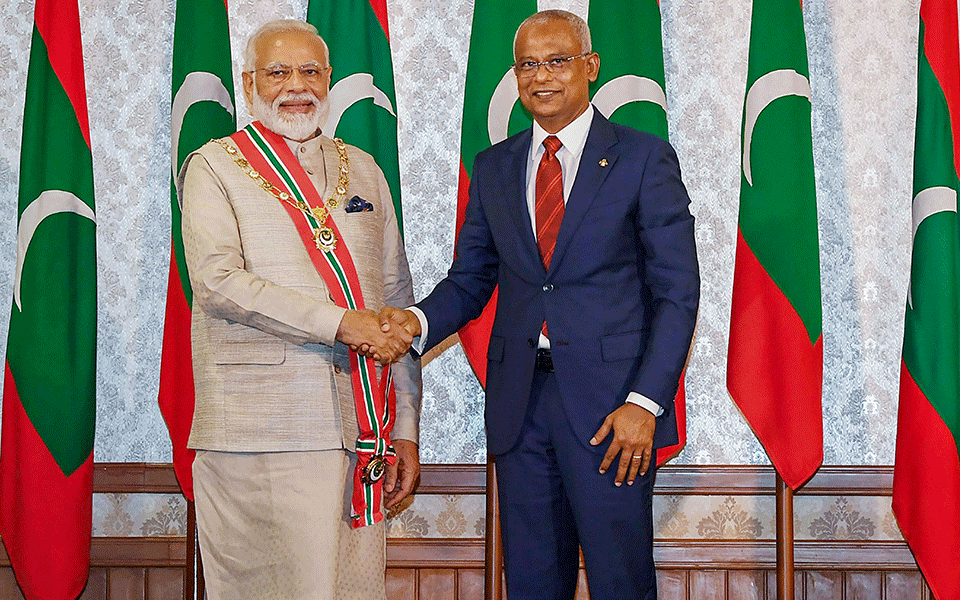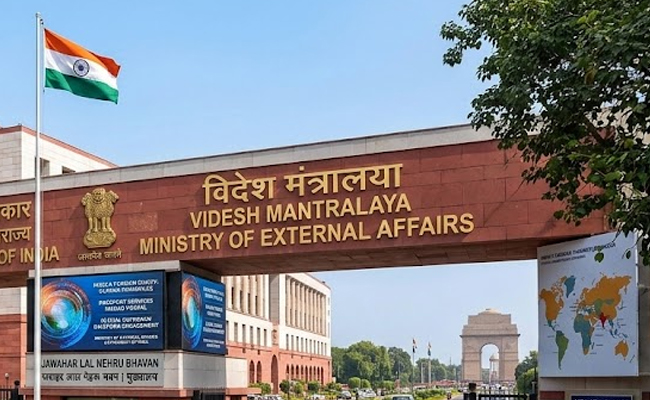Male: India will contribute to the conservation of Maldives' Friday Mosque, a unique place of worship made of coral stones, Prime Minister Narendra Modi has announced.
Modi made the announcement while addressing the Muslim-majority country's Parliament, The People's Majlis, on Saturday and noted that the relations between India and the Maldives were older than history.
He said India will contribute to the conservation of Maldives' Friday Mosque also known as Hukuru Miskiy.
"There is no such mosque elsewhere in the world like this historical mosque made up of coral," Modi said.
He said he was happy that the Maldives was working towards sustainable development and has become a part of the International Solar Alliance.
Maldives President Ibrahim Mohamed Solih thanked the Indian side for their offer to carry out restoration of the Friday mosque by the Archaeological Survey of India under an Indian grant, said a joint statement.
He also appreciated the recent visit of senior scientists of the Indian Council of Agricultural Research and their ongoing cooperation with the Maldivian counterparts, it added.
Built in 1658, Friday Mosque is one of the oldest and most ornate mosques in the city of Male in Kaafu Atoll. The mosque was added to the tentative UNESCO World Heritage cultural list in 2008 as unique examples of sea-culture architecture.
Modi arrived in the Maldives on Saturday on his first two-day foreign visit after re-election as Prime Minister to strengthen the bilateral ties, reflecting the importance India attaches to its 'Neighbourhood First' policy.
His visit demonstrates the priority that India attaches to the SAGAR (Security and Growth for All in the Region) doctrine.
The relations between India and the Maldives deteriorated after the then President Abdulla Yameen imposed emergency on February 5 last year.
Some decisions by Yameen including imposition of restrictions on work visas for Indians and signing of a new Free Trade Agreement with Beijing also did not go down well with New Delhi.
However, the ties were back on track under Solih's presidency.
China views the Maldives as key to its Maritime Silk Road project in the Indian Ocean as it has already acquired Hambantota port in Sri Lanka and Djibouti in the Horn of Africa.
Let the Truth be known. If you read VB and like VB, please be a VB Supporter and Help us deliver the Truth to one and all.
New Delhi (PTI): The Ministry of External Affairs (MEA) has set up a control room to assist those affected by the escalating crisis in West Asia.
The MEA has said almost one crore Indian citizens live in West Asia and their safety and well-being is of "utmost priority" for New Delhi.
As the Iran-US conflict widened, the Indian embassy in Iran moved hundreds of Indian students from the Iranian capital of Tehran to safer locations.
"A Control Room has been set up in the Ministry of External Affairs in view of the current situation in West Asia and the Gulf region," the MEA said on Wednesday.
"The Control Room can be contacted from 9 am to 9 pm at: 1800118797 (Toll Free) +91 11 2301 2113, +91 11 2301 4104, +91 11 2301 7905," it added.
The US launched military strikes on Iran on February 28, killing Iranian Supreme leader Ali Khamenei.
Following the military offensive, Iran has carried out a wave of attacks mainly targeting Israel and American military bases in several Gulf countries, including the UAE, Bahrain, Kuwait, Jordan and Saudi Arabia.
The MEA on Tuesday noted that almost one crore Indian citizens live and work in the Gulf region, and their "safety and well-being is of utmost priority."
"We cannot be impervious to any development that negatively affects them," it said.
The MEA said New Delhi will continue to closely monitor the evolving situation and take relevant decisions in the national interest, adding it is in touch with the governments in the region as well as other key partners.
A Special Control Room has been set up in the Ministry of External Affairs in view of the current situation in West Asia and the Gulf region. Details are as below ⬇️
— Randhir Jaiswal (@MEAIndia) March 4, 2026
🔗 https://t.co/nK3d6SY9Pa pic.twitter.com/v2EhUI5B1x




